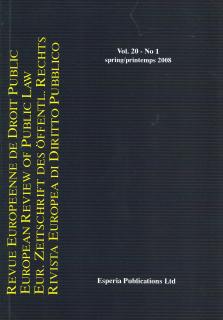
VERS UNE CONCEPTION NOUVELLE DE LA SÉCURITÉ EUROPÉENNE
(TOWARDS A NEW CONCEPT OF THE EUROPEAN SECURITY)
JACQUELINE DUTHEIL DE LA ROCHÈRE
Professeur à l'Université Paris II
The concept of security, which was initially reserved to the States' sovereignty under a certain Community control, has become a positive action vehicle for the Union only as soon as the Union came out of the strictly economic domain and started to pursue (beginning with the Treaty of Maastricht, 1992) the development of a common action both internal and external in areas supplementary of public policies (CFSP and JHA). With the Treaty of Amsterdam (1997) the prospect of making the Union an area of freedom, security and justice, combines cooperation methods and the progressive communitarisation of competences in the fields of visa, asylum, and immigration. At the Summit Conferences of Tampere (1999) and The Hague (2004) the idea of a new conception of the European security is con-firmed, marked by the will to react against the international terrorism and the development of the most various types of cross-border criminality, by always remaining faithful to the values of the Union. Heavy tendencies seem to arise in the context of the Constitutional Treaty, repeated in the Treaty of Lisbon: (1) a tendency to the progressive "unionisation" of the European security, within a common legal framework aiming at a better efficiency, but also anxious to guarantee the fundamental rights; (2) growing interconnection between the internal and the external security of the Union, in particular regarding the prevention of terrorism, which leads to the question, often formulated in complicated terms, of the relations between the na¬tional, European and international systems of protection of individuals. The present report analyses the provisions of the amending treaty on AFSJ and also looks into the jurisprudence of the Court of Justice with regard to the prevention of terrorism.
Le concept de sécurité, d'abord réservé au domaine régalien des Etats sous condition d'un certain contrôle communautaire, n'est devenu un vecteur d'action positive pour l'Union qu'à partir du moment où cette dernière est sortie du champ strictement économique et a cherché (à partir du traité de Maastricht, 1992) à développer une action commune à la fois interne et externe dans des champs complémentaires de politiques publiques (PESC et JAI). Avec le traité d'Amsterdam (1997), la perspective de faire de l'Union un espace de liberté, de sécurité et de justice, combine techniques de coopération et la communautarisation progressive des compétences en matière de visa, asile, immigration. Aux sommets européens de Tampere (1999) et de La Haye (2004) se confirme l'idée d'une conception nouvelle de la sécurité euro¬péenne, marquée par la volonté de réagir au terrorisme international et au développement des formes les plus variées de criminalité transfrontière, tout en restant fidèle aux valeurs de l'Union. Des tendances lourdes semblent émerger dans le traité constitutionnel, reprises par le traité de Lisbonne: (1) tendance à l'"unionisa-tion" progressive de la sécurité européenne, dans un cadre juridique commun visant à une meilleure efficacité, mais soucieux également de la garantie des droits fondamentaux; (2) interconnexion croissante entre sécurité interne et sécurité externe de l'Union, notamment à propos de la prévention du terrorisme, ce qui conduit à poser en termes souvent fort complexes la question des relations entre les systèmes na¬tio¬naux, européens et internationaux de protection des personnes. Le présent rapport analyse les dispositions du traité modificatif sur l'ELSJ et se penche également sur la jurisprudence de la Cour de justice en matière de prévention du terrorisme.





















